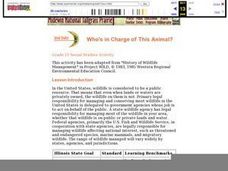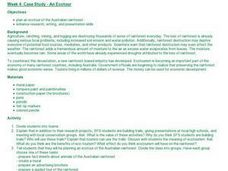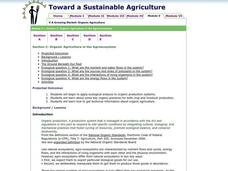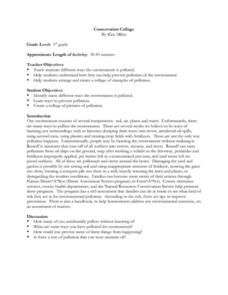Curated OER
They're Tilling that Field Behind the Mall
Unfortunately, the article for which this resource was written is not available. You can, however, find another current document on agriculture and urban development for your class to read together, and then still follow the suggested...
Curated OER
Dishing the Dirt Part 1
Students create a soil center on their school grounds. They begin to write in their science journals. They participate in an experiment that helps the community begin their own gardens.
Curated OER
Dishing the Dirt Part 2
Students explore the differences between specific soil characteristics. They participate in an experiment in which they discover soil texture. They write their observations in a journal.
Curated OER
TE Activity: Cool Views
Students define preservation and conservation before listening to an article read by the teacher about John Muir and Gifford Pinchot, famous environmentalists. They complete a Venn diagram before deciding which side of this environmental...
Curated OER
Erosion
Fifth graders engage in some activities that will help them to identify erosion and explain the causes of erosion. They also look into ways that humans can slow the process of erosion in some cases. After a teacher-led demonstration,...
Alabama Learning Exchange
WATER You Doing to Help?
Auntie Litter is here to educate young scholars about water pollution and environmental stewardship! Although the 15-minute video clip is cheesy, it's an engaging look at the water cycle and conservation. Learners start by illustrating...
Alabama Learning Exchange
Good Litter, Bad Litter
Which ones can be thrown on the ground? Discover the difference between natural litter and unhealthy trash, helping scholars by using several examples. Use the information here to give them a basic background, but also encourage prior...
Indian Land Tenure Foundation
Relationships to Places
Young historians take a look at how the Indian tribes of California promoted a mindful relationship between people and the land. They begin to understand how the Indians were champions of conservation, and at preserving the natural...
Curated OER
Outdoor Education
Learners participate in various outdoor activities to teach them about the environment. In this outdoor education lesson plan, students participate in activities such as compass direction, conservation, forestry, wildlife, and...
Curated OER
Who's in Charge of This Animal?
Eleventh graders study wildlife management and identify the appropriate government agencies that are in charge. They examine different wildlife management techniques. They write a letter showing interest in the activities of one of the...
Safe Drinking Water Foundation
Types of Water Pollution
In groups, young environmentalists investigate water samples that are contaminated with different types of pollutants. Each group presents their findings to the class and fills out the "Types of Pollutants Chart." This lesson is meant...
Curated OER
Renewable vs. Non-Renewable Resources
Here's a fine activity on renewable and non-renewable sources of energy for your 5th graders. In it, learners list a number of natural resources on the board, then try to sort the resources into appropriate categories. This helps them to...
Curated OER
The Human Impact on the Environment
Despite the typos and formatting issues, the Word document found here has some great potential. There are two questions that ask learners to put several events in a logical order; these could easily be made into a card sort activity....
Curated OER
You Are What You Drink!
Young scholars explore water treatment systems. In this water conservation ecology lesson, students identify and explain several processes used for water treatment and define related vocabulary after listening to content information...
Curated OER
Case Study - An Ecotour
Students plan an ecotour of the Australian rainforest. They prepare fact sheets about animals, create a mural, prepare a advertising brochure and a guided tour of the rainforest.
Curated OER
Marine & Aquatic Habitats Activities - Walk in the Wetlands
Young scholars research various types of fresh water wetlands and identify the common animal and plant life in these different ecosystems. They further analyze the need to protect these wetlands and explore their varied uses.
Marine Institute
Water Pollution
Sixth graders investigate the various types of pollutants found in water and ways to help prevent water pollution. Through a hands-on experiment, students create samples of polluted water by mixing water with vegetable oil, dirt,...
Curated OER
The Dirt on Worms!
Fourth graders make predictions, observe, collect and record data. They investigate several soil and worm websites. Finally, 4th graders write a letter to The President which defends earthworms by explaining their value to the United...
Curated OER
Examining a Hazardous Waste Site
High schoolers identify activities that produce hazardous waste. They examine how contaminants are spread in air and water. They work together to create a model to show how the contaminants move through water.
Curated OER
Toward a Sustainable Agriculture
Students analyze organic production systems. In this organic agriculture lesson, students examine key organic practices for both crop and livestock. This lesson includes 5 different activities, 4 critical thinking questions and...
Curated OER
Food Web
Young scholars are able to define food web, and identify the interdependence of organisms within a system. They are able to describe how natural events and human activities can impact a food web.
Curated OER
Conservation Collage
Students identify many different ways the environment is polluted, and determine ways to prevent pollution. They create a collage of pictures describing how the earth becomes polluted.
Serendip
Where Does a Plant's Mass Come From?
Where does the mass for a growing tree come from? Scholars consider a few different hypotheses and guess which is correct. They then analyze data from different experiments to understand which concepts science supports.
Curated OER
Not Only a Drought
Students explore the events that occurred during the Dust Bowl and differentiate between the good and bad agricultural practices. In this Dust Bowl lesson students participate in activities that shows them how to be good stewards...
























